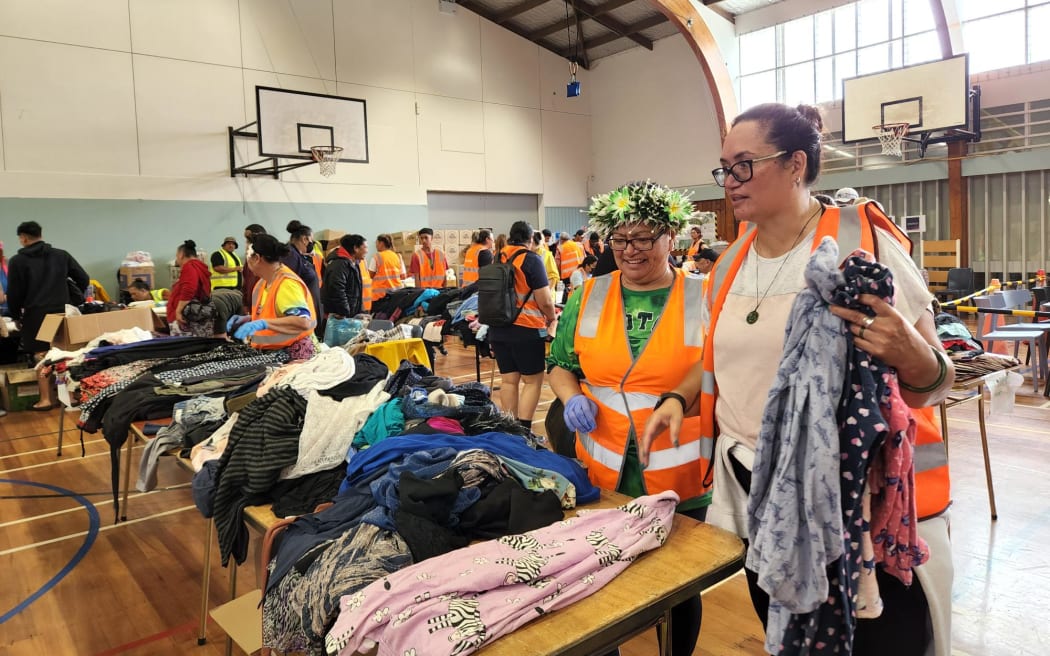Leadership, preparedness and communication have been pinpointed as the keys to handling emergencies. Auckland fell down on all three during its big storms, but the city's response is being used as lessons for others.

Hundreds were helped at the Mangere Emergency Centre set up in south Auckland as a response to the January floods. Photo: RNZ / Lucy Xia
Auckland has been judged and found wanting for the state of its emergency management preparedness in a report detailing a lack of leadership and general chaos during that unprecedented stormy day on January 27.
At the time, a defensive Mayor Wayne Brown tossed off a comment to RNZ's Kim Hill that it would be "interesting to see just how well prepared Wellington is when the earthquake hits".
How well is the rest of the country prepared? When disaster strikes elsewhere will a well-oiled machine slide into place, or will it be another case of chickens running around with their heads cut off?
It's not a surprise that after a series of historic failings, the disastrous response to the Auckland floods is now a case study in what not to do.
Jon Mitchell specialises in disaster response and recovery leadership at Massey University's Joint Centre for Disaster Research. He says there are civil defence emergency management groups around the country - and in Australia - looking at the Auckland situation and learning lessons from it.
"There's a saying in emergency management, 'you never let a good crisis go by'," he says. "So here's an opportunity to learn some real lessons and embed those in what we do in future."
Mitchell says the Auckland super city no longer has the advantage of having many smaller councils, each with its own emergency management systems and staff, contributing local knowledge to a regional body. It has just one central emergency management office, which is among the changes recommended by the review into the disaster.
On The Detail, Mitchell talks about how work was being done on trying to improve things, and failures of the past.
Unfortunately, for him, there were no surprises from Auckland leadership that night.
"We could see other emergency management groups - Northland and Bay of Plenty to the north and east - were more proactive in their response to exactly the same warnings from the MetService.
"They were able to stand up a response more effectively than Auckland.
"It's much easier to explain why you have over-reacted when people's lives are at risk, than it is trying to explain afterwards when you haven't [been] proactive enough."
But even with the best laid plans nature can and will do something unexpected.
That's exactly what happened in August last year when bad weather was heading to the top of the South Island.
Tasman District mayor Tim King says it was anticipated that the rain event would hit the western part of the region, so resources were pre-deployed to Golden Bay, which risked being cut off at Takaka Hill - that's certainly happened before.
"As it happened, the rain event didn't do quite what was forecast and hit Nelson City," he says.
His role as mayor then wasn't strictly about making decisions or gathering information - it was to listen to emergency services agencies including Fire and Emergency and Civil Defence, ask questions about the level of preparation.
King says the role of the mayor under such circumstances isn't well understood.
"The only real decision you have is the declaration of emergency," he says. That decision is made based on advice from Civil Defence, and its controller is ultimately responsible for how events roll out.
"The mayor's role is to support them to ask the questions, to rely on their advice for making decisions where you're asked to ... and supporting everyone who's involved, communicating clearly and providing that sense of confidence that things are under control. It isn't to get in there and start to manage the situation because you have a structure in place that's there to do that. Basically, it's all about communicating."
Mike Bush, the head of the Independent Review Panel into the Auckland floods, says when you're talking to the public you need to give them information; if you don't know what's going on you tell them why you don't know.
People need advice - and you must also give assurance that you're doing your very best, and that must be delivered with empathy. But in order to do that, you have to have the facts, he says.
To hear more about which locations have a handle on that - and are handling emergencies well - listen to the full podcast episode.
You can find out how to listen to and follow The Detail here.
You can also stay up-to-date by liking us on Facebook or following us on Twitter.

Photo:


